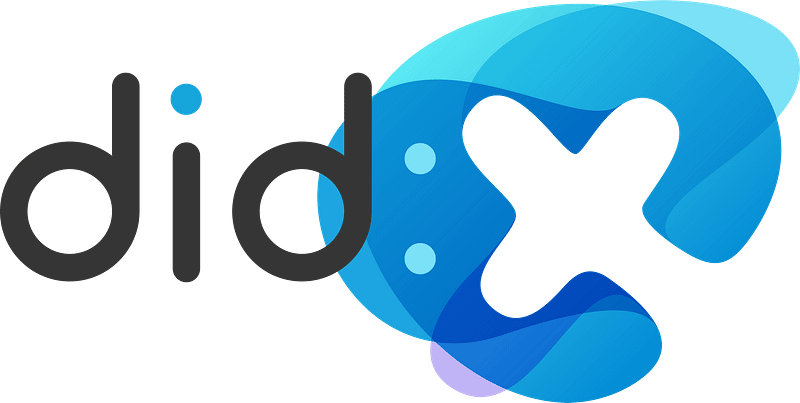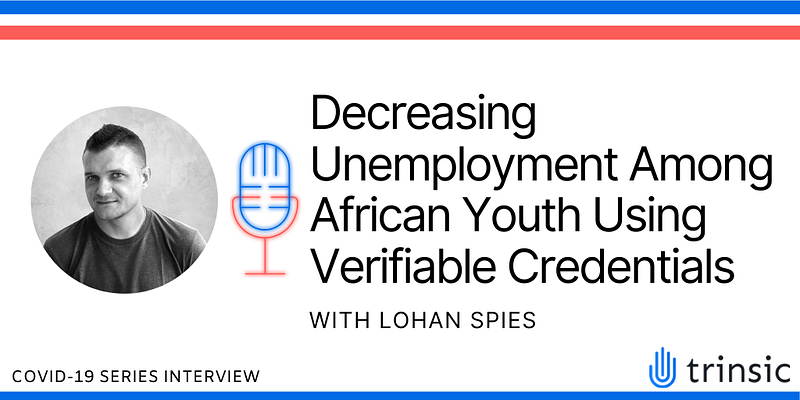In response to COVID-19, businesses and industries around the world have had to reduce spending and cut costs in order to continue operating. This has led to businesses being reluctant to hire new employees and unfortunately having to lay off employees. Recent college graduates and youth are having to navigate this difficult economic situation as they search for employment.
In Africa, these difficulties are magnified by the pre-existing high unemployment rate among African youth. Yoma is a platform that uses verifiable credentials to help African youth build up their digital CV and find employment that matches their skills. Although Yoma and its benefits were relevant and needed before the pandemic, the economic impacts of COVID-19 have only increased the platform’s effectiveness for African youth.
Below is the interview we had with Lohan Spies, the individual responsible for integrating verifiable credentials into the Yoma platform using the Trinsic platform.
Can you give us some background about you and your company DIDx?
I have been a co-founder of various cybersecurity and blockchain-based ventures in digital identity and personal data protection. I am also the Chair of the Sovrin Steward Council and an ex-officio Board of Trustees member at the Sovrin Foundation. My passion and motivation are to leverage the Trust over IP stack to develop solutions that will have a profound and lasting impact on humanity.
My latest venture, DIDx, focuses on SSI and is a Founding Steward of the Sovrin Network and a Founding Contributing Member of the Trust over IP Foundation.

What is Yoma? What is its purpose?
Globally, one out of five young people between the ages of 15-24 live in Africa and are largely underemployed or at worst, are unemployed. According to the African Development Bank, youth unemployment occurs at a rate that is more than twice of that for adults in most African countries. Many of these individuals are unable to secure jobs due to a lack of education, experience, and financial means. Furthermore, there is a scarcity of decent job opportunities that could use employees to their full potential in most African countries. Skills needed in Sub-Saharan Africa are shifting, and the region’s educational system is underprepared, resulting in a skills mismatch between the skills being acquired and those required by companies.
Our aim is to unlock the youth’s potential across the African continent and beyond by integrating privacy-preserving personalized learning pathways across the Yoma platform. Yoma, a youthagency marketplace, aims to use AI to match youth with individualized learning pathways, impact tasks to positively contribute to their community, and jobs based on their aspirations and psychometric profile. Youth are incentivized to participate via a digital token that can be redeemed in a physical or intellectual marketplace. Each individual youth has a digital identity wallet that contains their engagement and certificates, thus building a digital CV that is verifiable through blockchain technology.

The Yoma marketplace brings together youth, NGOs/grassroots organizations, governmental youth agencies, social impact investors, corporate, SMEs, educational providers, and more. Yoma is supported by a strong group of collaborators such as UNICEF, DIDx, Rlabs and Cartedo.
A brief explainer video of Yoma can be found below.
How does Yoma help people deal with COVID-19 related challenges?
The Yoma concept was relevant prior to the COVID-19 crisis but given the disproportionate impact on young people’s learning and employment, there is an even greater need for a solution like Yoma.
One of the pathways into the Yoma platform was via a COVID-19 UNICEF innovation challenge implemented by Cartedo, an online design thinking platform. Users who completed the challenge were redirected to the Yoma platform to acquire their certificate of completion. This UNICEF innovation challenge aimed to support youth agency during the COVID-19 pandemic through critical soft-skill development and by identifying high potential individuals whose ideas could be supported and developed further. The core goals for the challenge were to: 1) Give youth a voice, 2) Provide access to credible information, 3) Drive awareness around COVID-19, 4) Develop critical soft skills and future-readiness, and 5) Enhance employability.
The challenge was well received with 85,000 youth showing interest, 35,000 starting the challenge, and 9,500 who completed the challenge. For all youth that completed the challenge, Yoma issued a verifiable credential as a proof of completion and as the first verifiable credential added to their verifiable, digital CV.
An explainer video of the UNICEF COVID-19 challenge can be found below.
What caused you to decide to use Trinsic's APIs in the backend of the platform? And what caused you to build on the Sovrin blockchain?
Trinsic provides a full-stack self-sovereign identity platform leveraged by Yoma. Yoma currently makes use of the cloud wallet and credentialing APIs to provide youth with digital identity wallets into which Yoma issues verifiable credentials to develop their verifiable, digital CVs.
The speed of implementation required by Yoma made Trinsic a preferred choice as most of the hard work is already done and ready for consumption. Future iterations of the Yoma ToIP stack implementation will be focused on a blended approach where Trinsic and open-source SSI components will be made available to Yoma ecosystem partners.
We decided to develop on the Sovrin Network as it was purpose-built to solve the pressing problem of SSI. DIDx has a long history of working with Sovrin, and it was the obvious and preferred choice of technology for us.
That said, Yoma might spin up its own Indy network in the future, and ongoing analysis will contribute to our long-term strategy and decision-making. For the foreseeable future, Trinsic and the Sovrin Network are a part of our technology stack.
How are you growing the Yoma ecosystem? How big do you expect the Yoma platform to grow in the next year?
In addition to our success with the UNICEF COVID-19 challenge, Yoma recently won the joint EU/BMZ #SmartDevelopmentHack to accelerate the development and adoption of Yoma with atingi as an ecosystem partner.
Future challenges are already planned and will soon launch on Yoma, spanning multiple countries with increased access to opportunities for youth.
Given the COVID-19 crisis, the concept and value of the Yoma platform is more relevant than ever, and implementation must be accelerated. Therefore, as part of the #SmartDevelopmentHack, the Yoma initiative has committed to reaching 1.5M youth within 24 months.
(End of interview)
If you are an African youth interested in building your digital CV through the Yoma platform, get started by creating a Yoma account. Any organization looking for talent or any social enterprise or impact investor wanting to participate in the Yoma ecosystem, should visit the www.yoma.africa website.
If your organization is looking to build a COVID-related verifiable credentials use case, we invite you to use the Trinsic platform for free. Contact us to learn more about this special offer or start building now by signing up for a Trinsic account.








